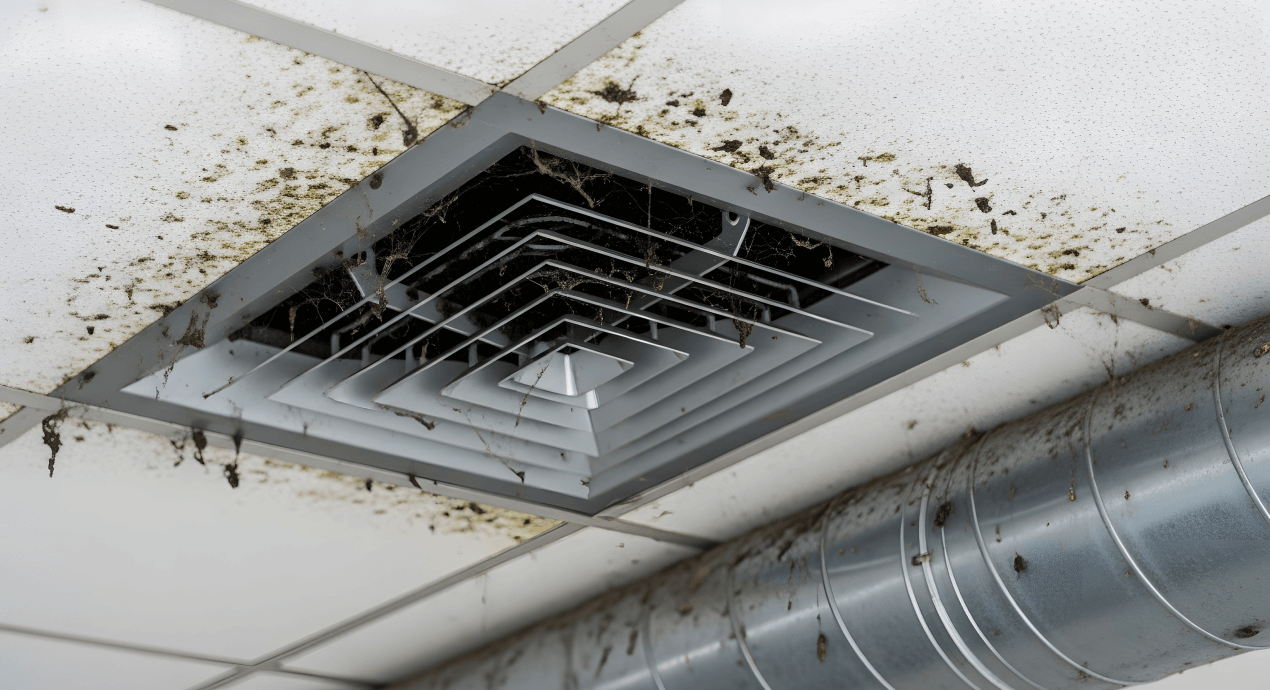
Contemplating coverage?
Subscribe to receive our emails & get
$200 OFF!
Have questions?
Call us: (833) 544-8273


Written By Erin Easley
Mold isn't just an unsightly annoyance. Left unchecked, it can adversely impact your health, damage your home, and put you under financial strain.
Mold spores are virtually everywhere, but they can germinate only in the right conditions. Mold requires moisture and can easily spread in dark, damp environments with inadequate airflow. Here are a few more specific causes of household mold:
Mold problems can sneak up on you, particularly if they begin inside walls or ceilings or in some other hard-to-reach location. Look out for these telltale signs of mold in HVAC system ducts and appliances.
If you discover mold in your HVAC system, your subsequent course of action will be dependent on the extent of the problem. The most effective way of eliminating mold from your ductwork will always be to hire professionals who specialize in mold remediation and know how to get rid of mold in HVAC system ductwork. They will have the tools, knowledge, and experience to ensure all the mold is destroyed and affected materials removed.
There are, however, some home remedies you can explore if you're confident that there are only small patches of mold and the problem hasn't yet spiraled out of control. If you can reach the spots of mold on your ducts and registers, scrub the area clean with a suitable cleaner. You can opt for a commercial mold remover, heavily diluted bleach solution, hydrogen peroxide, or even white vinegar. Ensure that you dry the area thoroughly after cleaning. If you notice any mold on soft surfaces or porous materials, you'll have to dispose of these materials. There's no saving them.
Follow these same procedures to remove mold from bathrooms or other areas in your home, but be careful not to bite off more than you can chew. Note that the EPA does not recommend DIY mold removal for patches larger than 10 square feet.
You can inhibit mold growth in your HVAC system by keeping your home dry and well ventilated. Here are some key tips to follow:
It's hard to overstate the importance of a regular HVAC maintenance schedule. Fresh filters, clean appliances, and service check-ups twice per year will help you minimize levels of dust, mold, and other particulate matter. A well-maintained HVAC system correlates directly with healthier air quality.
There's a reason Liberty Home Guard was rated the #1 Home Warranty
Service by U.S. News and World Report for 2021, 2022, 2023, and 2024. Check out our services.
Prevent HVAC mold by keeping your humidity levels below 55%, monitoring your home for plumbing or roof leaks, encouraging ventilation throughout your home, and staying on top of HVAC maintenance.
You can ask your HVAC tech to look for mold during a general service inspection, which ideally happens twice per year. If there is visible mold or musty odors coming from your ducts, schedule an inspection as soon as possible.
Yes, mold in your ductwork could negatively impact the efficiency of your HVAC appliances. Mold can increase the particulate matter in the air, trap moisture, and obstruct airflow, forcing your appliances to work harder.
Running an HVAC system already affected by mold could make the problem worse. The air will carry spores elsewhere in your home, potentially causing the mold to spread or grow in new locations.
Remediation companies may be reluctant to guarantee permanent removal. Mold can be an insidious problem. Remediation specialists will do their best to remove all traces of mold in your home, but mold spores are virtually everywhere, and the problem could come back if you don’t treat the root cause.
If you’d like enduring warranty support for your home’s HVAC system, reach out to our team to learn more about our coverage options. While home warranty coverage is unlikely to cover mold remediation, it can help you with maintaining your appliances and systems to keep mold from developing in the first place. Call (833)-543-9576 to learn more.
Stay Ahead of Potential
Home Mishaps!
Subscribe to our Liberty Home Guard Newsletter and gain access to exclusive content that ensures your peace of mind.